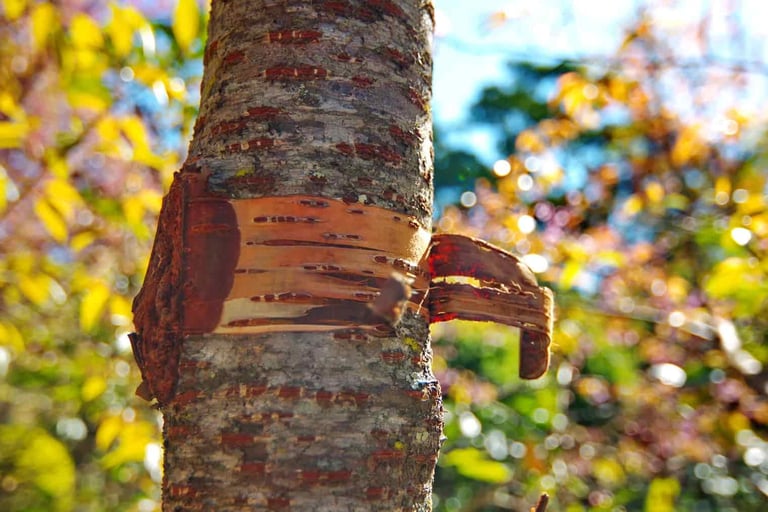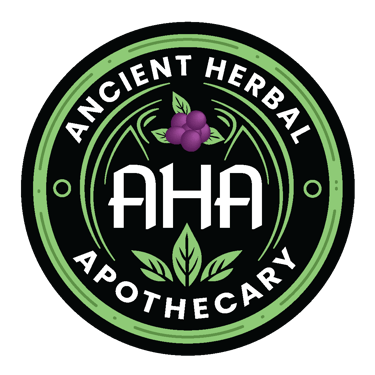Wild Cherry Bark
Nature's Hidden Treasure
Luann Morris
5/17/20242 min read


Unlocking the Secrets of Wild Cherry Bark: Nature's Hidden Treasure
In the depths of forests, hidden amongst the verdant foliage, lies a treasure trove of botanical wonders. One such marvel is the Wild Cherry Bark, known scientifically as Prunus serotina. This unassuming tree harbors within its bark a plethora of active ingredients that have been cherished for centuries for their medicinal properties.
Scientific Name: Prunus serotina
Active Ingredients:
1. Amygdalin: Also known as vitamin B17 or laetrile, it is believed to have anti-inflammatory and anticancer properties.
2. Prunasin: This compound possesses expectorant and antitussive properties, making it useful for respiratory ailments.
3. Tannins: Known for their astringent properties, tannins help to tighten and tone tissues, aiding in the treatment of diarrhea and sore throats.
4. Coumarins: These compounds have anticoagulant properties and may help in improving blood flow.
Health Benefits:
1. Respiratory Relief: Wild Cherry Bark has long been used as a natural remedy for respiratory conditions such as coughs, colds, bronchitis, and asthma. Its expectorant properties help to loosen mucus and alleviate coughing, making it easier to breathe.
2. Antioxidant Support: The presence of amygdalin in Wild Cherry Bark offers antioxidant benefits, protecting cells from oxidative damage caused by free radicals.
3. Digestive Aid: Tannins found in Wild Cherry Bark help to soothe and protect the digestive tract, making it useful in treating diarrhea and gastrointestinal discomfort.
4. Anti-inflammatory Properties: The compounds present in Wild Cherry Bark have anti-inflammatory effects, which may help in reducing pain and swelling associated with conditions like arthritis.
5. Antimicrobial Action: Wild Cherry Bark exhibits antimicrobial properties, which can help in fighting off infections and promoting overall immune health.
Contraindications:
While Wild Cherry Bark offers numerous health benefits, it is essential to exercise caution and be aware of potential contraindications:
- Pregnancy and Lactation: Pregnant or breastfeeding women should avoid consuming Wild Cherry Bark due to potential risks to the developing fetus or infant.
- Allergic Reactions: Individuals with known allergies to plants in the Rosaceae family, such as cherries, plums, peaches, or almonds, should avoid Wild Cherry Bark to prevent allergic reactions.
- Blood-Thinning Medications: Wild Cherry Bark contains coumarins, which possess anticoagulant properties. Therefore, individuals taking blood-thinning medications should consult a healthcare professional before using Wild Cherry Bark to avoid potential interactions.
Folklore and Cultural Significance:
Throughout history, Wild Cherry Bark has held a revered place in various cultures and folklore:
- Native American Remedies: Indigenous peoples of North America, such as the Cherokee and Iroquois tribes, used Wild Cherry Bark as a traditional remedy for coughs, colds, and fevers.
- European Traditions: In European folk medicine, Wild Cherry Bark was often used to treat digestive issues, respiratory ailments, and as a mild sedative.
- Symbolism: Cherished for its delicate blossoms and tart fruits, the cherry tree symbolizes resilience, renewal, and the fleeting nature of life in many cultures.
In conclusion, Wild Cherry Bark stands as a testament to nature's healing power, offering a bounty of health benefits steeped in centuries of tradition and wisdom. While its use should be approached with caution and under the guidance of a healthcare professional, the potential therapeutic effects of Wild Cherry Bark are undeniable, making it a valuable ally in the quest for holistic well-being.
